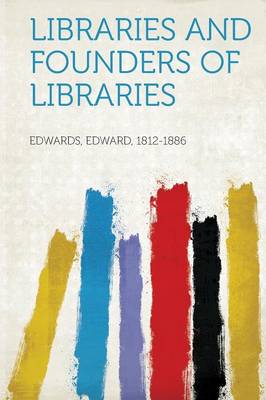Cambridge Library Collection - History of Printing, Publishing and Libraries
7 total works
This comprehensive volume, first published in 1864, covers the history of libraries from classical times to the nineteenth century, principally in England but also further afield. The author was an influential figure in the founding of municipal libraries in nineteenth-century Britain and regarded access to good libraries as crucial to education and civilisation. He emphasises the importance of individual collectors in the building of great libraries, and examines the personal holdings of many writers and scholars as well as members of royal families, the aristocracy, and clergy. Some of these are well known, others less commonly encountered in surveys of library history. Edwards also discusses the subsequent history of these collections, their dispersal or incorporation into other libraries. Other important topics covered by Edwards include the development and organisation of the State Paper Office and Public Records Office from the medieval period onwards.
This monumental work, first published in 1859, covers the history of libraries from classical times to the mid-nineteenth century, in Britain, Europe and America. The author was influential in founding municipal libraries in nineteenth-century Britain and regarded access to good libraries as crucial to education and civilisation. Volume 1, divided by the author into five 'books', is reissued here in two parts. The first two books deal with classical and medieval libraries, examining English and European monastic libraries in depth. Book 3 describes the core collections of the British Museum and other major university, ecclesiastical and public libraries of Britain and Ireland. Book 4 discusses the principal libraries of America and Book 5 those of continental Europe, from France to Hungary and Russia. The final volume (in four 'books') sets out Edwards' views on all aspects of library management, from physical layout and classification to rules and regulations.
This two-volume work covers the period 1570-1870, and is one of several written on book collections by Edward Edwards (1812-1886), whose three-volume Memoirs of Libraries is also reissued in this series. Volume 1 considers the gatherers of the 'foundation collections' of the British Museum. Among them were Henry, Prince of Wales, the son of James I, Sir Robert Cotton (1571-1631), and Sir Hans Sloane (1660-1753), whose bequest of his collections to George II led directly to the foundation of the Museum by Act of Parliament in 1753. The administrators and early donors to the Museum - archaeologists, travellers and dilettanti such as Sir William Hamilton and the earl of Elgin - are also discussed.
This monumental work, first published in 1859, covers the history of libraries from classical times to the mid-nineteenth century, in Britain, Europe and America. The author was influential in founding municipal libraries in nineteenth-century Britain and regarded access to good libraries as crucial to education and civilisation. Volume 1, divided by the author into five 'books', is reissued here in two parts. The first two books deal with classical and medieval libraries, examining English and European monastic libraries in depth. Book 3 describes the core collections of the British Museum and other major university, ecclesiastical and public libraries of Britain and Ireland. Book 4 discusses the principal libraries of America and Book 5 those of continental Europe, from France to Hungary and Russia. The final volume (in four 'books') sets out Edwards' views on all aspects of library management, from physical layout and classification to rules and regulations.
This two-volume work covers the period 1570-1870, and is one of several written on book collections by Edward Edwards (1812-1886), whose three-volume Memoirs of Libraries is also reissued in this series. Volume 2 looks at some of the early donors of books to the Museum. A chapter is then devoted to the Royal Library of King George III. Finally, Edwards concentrates on the period 1829-1870, giving a general view of the growth of the British Museum under a series of chief librarians, including his own contemporary, Sir Anthony Panizzi. Later chapters look at the donors of items in the ever-growing collection of antiquities, and give an account of the Grenville Library of over 20,000 books, bequeathed to the Museum in 1846 by one of its Trustees.
This monumental work, first published in 1859, covers the history of libraries from classical times to the mid-nineteenth century, in Britain, Europe and America. The author was influential in founding municipal libraries in nineteenth-century Britain and regarded access to good libraries as crucial to education and civilisation. Volume 1, divided by the author into five 'books', is reissued here in two parts. The first two books deal with classical and medieval libraries, examining English and European monastic libraries in depth. Book 3 describes the core collections of the British Museum and other major university, ecclesiastical and public libraries of Britain and Ireland. Book 4 discusses the principal libraries of America and Book 5 those of continental Europe, from France to Hungary and Russia. This final volume (in four 'books') sets out Edwards' views on all aspects of library management, from physical layout and classification to rules and regulations.
Free Town Libraries, their Formation, Management, and History
by Edward Edwards
Published 1 April 2010
An important figure in the establishment of free libraries in the United Kingdom, Edward Edwards (1812-1886) wrote this study, first published in 1869, as a handbook intended for promoters and managers of free town libraries. The book outlines the formation and workings of public libraries, beginning with British examples and proceeding to compare the British experience with libraries abroad, especially in America. Edwards presents strong evidence of the increasing number, and improving management, of libraries at this time, and also stresses the strikingly diverse circumstances under which libraries in the United Kingdom and abroad were established. The volume is an important historical document in library studies, and a testimony to Edwards' commitment and contribution to the free library movement which have been an inspiration to later generations of professional librarians.


